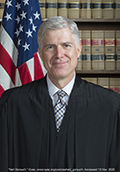 Associate Justice Neil M. Gorsuch discussed the differences between serving as a federal appellate judge and a Supreme Court justice, his judicial philosophy, the importance of an impartial justice system and how the Supreme Court decides which cases to hear in a wide-ranging conversation with Professor Tim Meyer on Nov. 10.
Associate Justice Neil M. Gorsuch discussed the differences between serving as a federal appellate judge and a Supreme Court justice, his judicial philosophy, the importance of an impartial justice system and how the Supreme Court decides which cases to hear in a wide-ranging conversation with Professor Tim Meyer on Nov. 10.
The discussion with VLS students and faculty, held via a Zoom conference due to the pandemic, was part of the Cecil Sims Lecture Series, established in 1972 to “bring to Vanderbilt Law School distinguished men and women with extensive legal experience to associate informally with faculty and students.” Justice Gorsuch is the ninth Supreme Court justice to speak at VLS through the series, which has also hosted six attorneys general.
Responding to Meyer’s question about how his elevation from a seat on the 10th Circuit Court of Appeals to the Supreme Court had changed his life, Gorsuch cited the public notoriety that comes with being one of nine Supreme Court justices. “In the course of losing my anonymity, I was given a gift in return,” he said. “For me it was an opportunity to witness the love of country and the deep care that the American people have for the institution of our courts and our government—people of all stripes and political persuasions coming up to me and wishing me well. Those kinds of small moments have been very inspiring.”
Gorsuch emphasized the courts’ important, longstanding role as an impartial arbiter of legal disputes. “I’ve been a lawyer and a judge for a long time,” he said. “As a lawyer, all I wanted was a fair shake for my client, and I felt like I was playing by rules that were fair, known in advance and would be followed. I came to have great respect for members of the judiciary. They became friends as well as heroes.”
When appointed to a seat on the 10th Circuit Court of Appeals, Gorsuch joined a small cadre of 180 federal appellate judges nationwide, handled a diverse range of appeals from district courts in Oklahoma, Kansas, New Mexico, Colorado, Wyoming and Utah, and served with judges appointed by presidents from Barack Obama to Lyndon Johnson. The cases that reached the appeals court were the hard cases, he said, emphasizing that judges with diverse backgrounds and perspectives nevertheless usually reached unanimous decisions. “Who the president was, and who appointed the judge had very little to do with the disposition of cases,” he said.
Of the 70 cases typically heard by the Supreme Court each year, Gorsuch noted that the court reaches unanimous decisions about 40 percent of the time.
Gorsuch also offered perspective on lower courts’ handling of an extremely high volume of cases, about 95 percent of which are resolved in federal and state trial courts. “Only about 5 percent of cases go up on appeal,” he said.
Justice Gorsuch ended his discussion by urging students in the audience to consider judicial clerkships. “I think you’ll find the opportunity early in your career will change your life and enrich it in ways that are very difficult to foresee,” he said. “You’re likely to get a lot more experience than you would in other settings. I don’t think there’s a better investment, at any age, in yourself. Not only is the experience instrumentally useful, but it’s extremely valuable.”
Gorsuch served on the 10th Circuit Court of Appeals, to which he was appointed by President George W. Bush, from 2006 to 2017, when he was nominated to the Supreme Court by President Donald J. Trump. Before entering private legal practice, he was a law clerk for Judge David B. Sentelle on the U.S. Court of Appeals for the District of Columbia Circuit and then for Associate Justices Byron R. White and Anthony M. Kennedy on the U.S. Supreme Court. He also served as the Principal Deputy Associate Attorney General at the U.S. Department of Justice from 2005 to 2006.
The Cecil Sims Lecture Series honors Cecil Sims, a 1914 first-honor graduate of Vanderbilt Law School and a founding member of the Nashville-based firm of Bass Berry & Sims. The Sims lectures vary in format from formal talks to more intimate conversations. Sims lecturers have included U.S. Supreme Court Justices John Roberts, Sonja Sotomayor, Clarence Thomas, Stephen Breyer, Sandra Day O’Connor, Antonin Scalia, Anthony M. Kennedy and William H. Rehnquist, and U.S. Attorneys General Eric H. Holder Jr., Elliott L. Richardson, Griffin Bell, William French Smith, Edwin Meese III and Janet Reno.